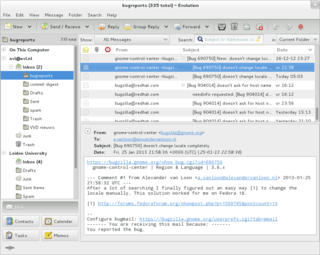Related Research Articles

Electronic mail is a method of exchanging messages ("mail") between people using electronic devices. Email entered limited use in the 1960s, but users could only send to users of the same computer. Some systems also supported a form of instant messaging, where sender and receiver needed to be online simultaneously. Ray Tomlinson is credited as the inventor of networked email; in 1971, he developed the first system able to send mail between users on different hosts across the ARPANET, using the @ sign to link the user name with a destination server. By the mid-1970s, this was the form recognized as email. Email describes the overall method and "an email" is a message in the system.

Microsoft Outlook is a personal information manager software system from Microsoft, available as a part of the Microsoft Office suite. Though primarily an email client, Outlook also includes such functions as calendaring, task managing, contact managing, note-taking, journal logging, and web browsing.

Corticosterone, also known as 17-deoxycortisol and 11β,21-dihydroxyprogesterone, is a 21-carbon steroid hormone of the corticosteroid type produced in the cortex of the adrenal glands. It is of minor importance in humans, except in the very rare case of congenital adrenal hyperplasia due to 17 alpha-hydroxylase deficiency.
Information overload is the difficulty in understanding an issue and effectively making decisions when one has too much information (TMI) about that issue, and is generally associated with the excessive quantity of daily information. The term "Information overload" was first used in Bertram Gross' 1964 book, The Managing of Organizations, and was further popularized by Alvin Toffler in his bestselling 1970 book Future Shock. Speier et al. (1999) said that if input exceeds the processing capacity, information overload occurs, which is likely to reduce the quality of the decisions.

A collaboration tool helps people to collaborate. The purpose of a collaboration tool is to support a group of two or more individuals to accomplish a common goal or objective. Collaboration tools can be either of a non-technological nature such as paper, flipcharts, post-it notes or whiteboards. They can also include software tools and applications such as collaborative software.
Media richness theory, sometimes referred to as information richness theory or MRT, is a framework used to describe a communication medium's ability to reproduce the information sent over it. It was introduced by Richard L. Daft and Robert H. Lengel in 1986 as an extension of information processing theory. MRT is used to rank and evaluate the richness of certain communication media, such as phone calls, video conferencing, and email. For example, a phone call cannot reproduce visual social cues such as gestures which makes it a less rich communication media than video conferencing, which affords the transmission of gestures and body language. Based on contingency theory and information processing theory, MRT theorizes that richer, personal communication media are generally more effective for communicating equivocal issues in contrast with leaner, less rich media.
Attention management refers to models and tools for supporting the management of attention at the individual or at the collective level, and at the short-term or at a longer term.

Media multitasking is the concurrent use of multiple digital media streams. Media multitasking has been associated with depressive symptoms and social anxiety by a single study involving 318 participants. A 2018 review found that while the literature is sparse and inconclusive, people who do a heavy amount of media multitasking have poorer performance in several cognitive domains. One of the authors commented that while the data does not "unambiguously show that media multitasking causes a change in attention and memory," media multitasking is an inefficient practice that requires "task switching" costs.
Information pollution is the contamination of information supply with irrelevant, redundant, unsolicited, hampering and low-value information. Examples include misinformation, junk e-mail and media violence.
Technostress has been defined as the negative psychological link between people and the introduction of new technologies. Where ergonomics is the study of how humans react to and physically fit with machines in their environment, technostress is a result of altered habits of work and collaboration that are being brought about due to the use of modern information technologies at office and home situations.
Environment and intelligence research investigates the impact of environment on intelligence. This is one of the most important factors in understanding human group differences in IQ test scores and other measures of cognitive ability. It is estimated that genes contribute about 20–40% of the variance in intelligence in childhood and about 80% in adulthood. Thus the environment and its interaction with genes account for a high proportion of the variation in intelligence seen in groups of young children, and for a small proportion of the variation observed in groups of mature adults. Historically, there has been great interest in the field of intelligence research to determine environmental influences on the development of cognitive functioning, in particular, fluid intelligence, as defined by its stabilization at 16 years of age. Despite the fact that intelligence stabilizes in early adulthood it is thought that genetic factors come to play more of a role in our intelligence during middle and old age and that the importance of the environment dissipates.
Information grazing refers to the ability to quickly obtain knowledge and facts just in time to solve new problems or answer questions. "Information grazing" can also be "information jumping", jumping from site to site and cherry-picking information seems to "rewire" the brain to deleterious effects or focus on something long enough to fully understand all its implications.
Work etiquette is a code that governs the expectations of social behavior in a workplace. This code is put in place to "respect and protect time, people, and processes." There is no universal agreement about a standard work etiquette, which may vary from one environment to another. Work etiquette includes a wide range of aspects such as body language, good behavior, appropriate use of technology, etc. Part of office etiquette is working well with others and communicating effectively.

Telephone phobia is reluctance or fear of making or taking phone calls, literally, "fear of telephones". It is considered to be a type of social phobia or social anxiety. It may be compared to glossophobia, in that both arise from having to engage with an audience, and the associated fear of being criticized, judged or made a fool of.
Interruption science is the interdisciplinary scientific study concerned with how interruptions affect human performance, and the development of interventions to ameliorate the disruption caused by interruptions. Interruption science is a branch of human factors psychology and emerged from human–computer interaction and cognitive psychology.
Carrier IQ was a privately owned mobile software company founded in 2005 in Sunnyvale, California. It provided diagnostic analysis of smartphones to the wireless industry via the installation of software on the user's phone, typically in a manner that cannot be removed without rooting the phone. The company says that its software is deployed in over 150 million devices worldwide.
An emergency communication system (ECS) is any system that is organized for the primary purpose of supporting one-way and two-way communication of emergency information between both individuals and groups of individuals. These systems are commonly designed to convey information over multiple types of devices, from signal lights to text messaging to live, streaming video, forming a unified communication system intended to optimize communications during emergencies. Contrary to emergency notification systems, which generally deliver emergency information in one direction, emergency communication systems are typically capable of both initiating and receiving information between multiple parties. These systems are often made up of both input devices, sensors, and output/communication devices. Therefore, the origination of information can occur from a variety of sources and locations, from which the system will disseminate that information to one or more target audiences.

Fear of missing out (FOMO) is the feeling of apprehension that one is either not in the know or missing out on information, events, experiences, or life decisions that could make one's life better. FOMO is also associated with a fear of regret, which may lead to concerns that one might miss an opportunity for social interaction, a novel experience, a memorable event, or a profitable investment. It is characterized by a desire to stay continually connected with what others are doing, and can be described as the fear that deciding not to participate is the wrong choice. FOMO could result from not knowing about a conversation, missing a TV show, not attending a wedding or party, or hearing that others have discovered a new restaurant. FOMO in recent years has been attributed to a number of negative psychological and behavioral symptoms.
Memory erasure is the selective artificial removal of memories or associations from the mind. Memory erasure has been shown to be possible in some experimental conditions; some of the techniques currently being investigated are: drug-induced amnesia, selective memory suppression, destruction of neurons, interruption of memory, reconsolidation, and the disruption of specific molecular mechanisms.
Mobile Panic is a term developed to explain mobile media and communication crisis. Young people especially are exposed to this panic and have become targets. Examples such as mobile sexting or under age app and social media use, exposes children to sexual and violent media. Phones on peoples persons at all times, raises concerns of surveillance of mobile phone and personal information. The term also refers to the issues associated with surveillance and the effects surveillance has on people. The term "Mobile Panic" was coined by Gerrod Goggin. The term separates from related Media Panic that has to deal with social concerns around media, public opinion and interest groups. Mobile Panic more deals with issues related to personal images, videos or information that is unauthorized by individuals for public viewing. Young people especially are at risk of this concern as teens share and send nude or semi nude photographs and videos to one another. Screen shooting images without persons approval sent via snapchat or other social media can be used as another example. The effects can be detrimental as examples of suicides after unwanted pictures become exposed of individuals on public humiliating media spaces.
References
- ↑ Sahoo, Reeta Sahoo, Gagan. Foundation of Information Technology. Saraswati House Pvt Ltd. ISBN 9788173356704.
- ↑ "the definition of infomania". www.dictionary.com. Retrieved 2019-05-03.
- 1 2 3 4 5 "'Info-mania' dents IQ more than marijuana". www.newscientist.com. Retrieved 2019-05-03.
- 1 2 Clarifying note by Dr. Glenn Wilson on the "Infomania" Study
- ↑ Zomorodi, Manoush. "Hi, I'm a digital junkie, and I suffer from infomania". Los Angeles Times . Retrieved 2019-05-03.
- ↑ Przybylski, Andrew K.; Murayama, Kou; Dehaan, Cody R.; Gladwell, Valerie (July 2013). "Motivational, emotional, and behavioral correlates of fear of missing out". Computers in Human Behavior. 29 (4): 1841–1848. doi:10.1016/j.chb.2013.02.014.
- 1 2 "The Cost of Interrupted Work: More Speed and Stress" (PDF).